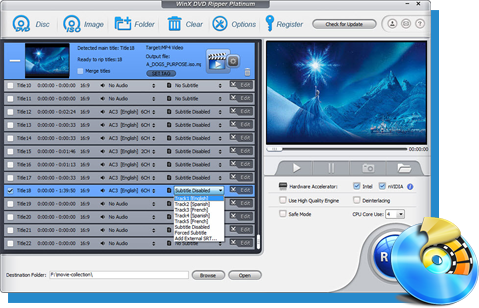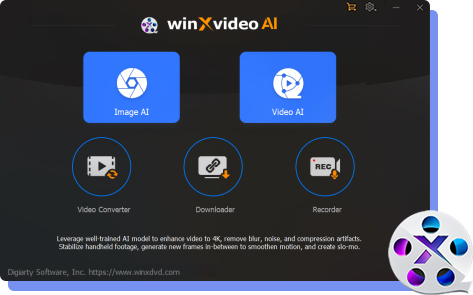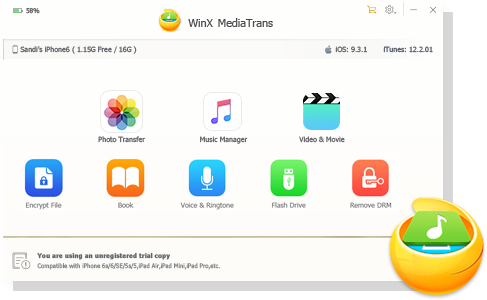Best 4K Video Cameras 2024 from DSLR/Mirrorless Types
The current smartphones like iPhone, Samsung, Huawei all support 4K video recording even at 60FPS. So many of you don't think it's necessary to invest $2000-$4000 on a traditional 4K video camera. However, some shutterbugs still prefer the professional 4K video camera/camcorder.
If you just happen to be one of them, this article is for you, with roundup of 2026 Best 4K video cameras (DSLR/Mirrorless) for your reference. And there's high likelihood that good offers on them will be coming on the Black Friday. Seize chance if your desired 4K camera makes the cut.
Hot search: Best SD Card for 4K Video Cameras >>
Convert, Compress, Edit, Enhance Videos Recorded by 4K Cameras
Winxvideo AI is a 4K video enhancer and converter. It will convert 4K videos from Canon, Sony, Panasonic, DJI, Gopro, mobiles, with support to 4K formats like HEVC, MOV, H.264, VP9/8, Prores, AVCHD, AVI, etc. Compress 4K videos by 90% smaller for easier upload to YouTube, Facebook, Instagram, WhatApp, etc. Its AI video enhancer will enhance 4K videos for better quality, stablize any shaky 4K videos, increase frame rates to 60fps, 120fps, 240fps, or higher. Denoise, merge, crop, split, rotate, download, record 4K videos, and more.
Top 5 4K Cameras
2026 Best 4K Cameras/Camcorders
Before upgrading your smartphone, you usually search online and make comparison to single out the fittest one, let alone the 4K video camera (much more expensive than your mobile phone). Well, what factors should you consider before making decision? The camera type, sensor, image processor, memory card capability or digital image stabilization? They cover, but are not limited to. Read the below best 4K cameras review and you will draw your own conclusion.
#1. Canon EOS 5D Mark IV
Pros:
- 30.4MP full-frame CMOS sensor.
- Support wide range of ISO, ISO 100-32000 expandable to ISO 50, ISO 51200, ISO 102400.
- DCI 4K is available, up to 4096x2160.
- Various storage medium, including SDHC card, SDXC card, CF card and SD card.
Cons:
- 4K 60FPS video recording feature is unsupported.
- The continuous shooting speed only 7FPS, leaving much to be desired.
- No image stabilization feature.
This 4K DSLR camera with 24-70mm f/4L Lens is a remarkable still photography option and 4K video camcorder, which amazes you with its 30.4MP full-frame CMOS sensor, paired with DIGIC 6+ image processor (adopts the newest denoising algorithm) to maximumly reduce noise/grainly level and to strike best balance between detail and 4K resolution. Beyond that, the wide range of ISO from 32000 to 102400 guarantees you the highest possible quality even shooting 4K footages at low-light place or indoors. It also gets improved in AF system, Wi-Fi, GPS and enhanced NFC.
Of course, it leaves much to be desired, as well. For instance, the continuous shooting speed, 4K video shooting frame rate, image stabilization function and higher FPS slow motion shooting, all these will help it to get a bigger piece of cake in the 4K video camera market if they get enhanced. If the price $3249 is acceptable, this Canon 4K camera is worth your investment.
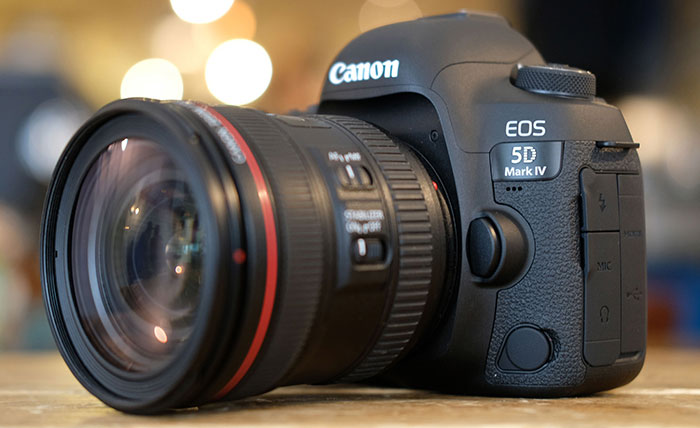
#2. Nikon Z6
Pros:
- 24.5MP Full-frame BSI image sensor with Nikon's advanced EXPEED 6 image processor.
- Maximum low-light capability, ISO 51,200 expandable to 204,800.
- The continuous shooting speed up to 12FPS.
- Up to 5 stops of VR image stabilization in up to 5 directions - yaw, pitch, roll, X and Y.
- Feature both 273-point on-sensor PDAF and eye-detection AF.
- Seamless integration with Nikon DSLR system.
Cons:
- 4K DCI and 4K 60FPS are unavailable.
- Only one XQD card slot.
- 3rd party batteries don't work.
Compared with the first Canon 4K DSLR camera, this Nikon 4K mirrorless camra is much cheaper, only $2,296.95. No doubt its price is a great appeal. You're definitely wrong if you think "the cheap buyer takes bad meat". Surprisingly, it brings you high cost performance.
The built-in 24.5MP Full-Frame BSI image sensor with Nikon's advanced EXPEED 6 image processor makes noise/grainly level better by roughly 1 stop over Nikon D610 and renders super clear, vibrant and hi-defi photos and 4K videos. And the powerful ISO allows low-light video (like northen lights) to be bright and vivid enough under the assistance of the digital viewfinder.
273* on-sensor AF points can capture 90% of the subject's frame (approx.) horizontally and vertically the moment they enter the frame and tracked throughout the frame. When the subject keeps changing the post, the eye-detection AF goes into action, tracking and locking focus on your subject's eye not only with AF-S (Single AF) mode, but also with AF-C (Continuous AF) mode. It's also useful in recognizing the eyes of multiple people and lets you decide which eye to focus on. Intelligent, isn't it?
There are minor beefs that acquires Nikon to take strides to, like the 4K DCI support, only one XQD card slot, medium-level pixels, battery issue. All in all, its advantages far outweighs disadvantages. Add the 4k camera to your shopping list.
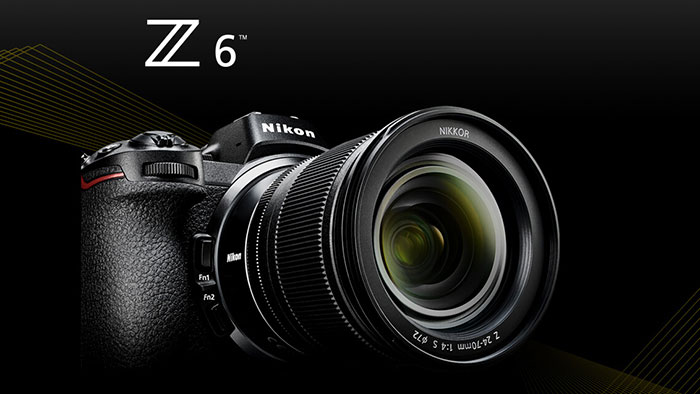
#3. Sony Alpha A7S III
Pros:
- 12MP BSI CMOS sensor with BIONZ XR processor.
- ISO 80-102,400 (expandable to 40-409,600)
- 5-axis in-body stabilization with SteadyShot active mode.
- 4K video at up to 120p, 60p for 'at least an hour.
- 10-bit 4:2:2 internal capture (in codecs including H.265 and All-I H.264).
Cons:
- Price.
- Relatively low sensor resolution.
A7S III 4K mirrorless camera from Sony raises the bar for what a full-frame mirrorless 4K camera is capable of. It makes an excellent combination of sensitivity, dynamic range, 4K resolution, and speed. The best selling point is the outsanding video and photo quality, collecting dramatically more light than the ordinary 4K digital cameras to produce subtly detailed images with lowest possible noise/grains, even in the toughest lighting circumstances. And most users gives this Sony 4K video camcorder a high scores on Amazon because of this character - currently most light sensitive camera!
This 4K video camera lacks trump cards compared with the above mentioned 4K digital cameras. It has no superiority in camea pixels, 4K video shooting ability (no 4K DCI, no 10/12 bit), continuous shooting rate, no unique tech (like Lumix GH5S' Timecode In/out). So all these factors decide its price only $2398. It's a nice choice if 4K video and low-light shooting are your demands.
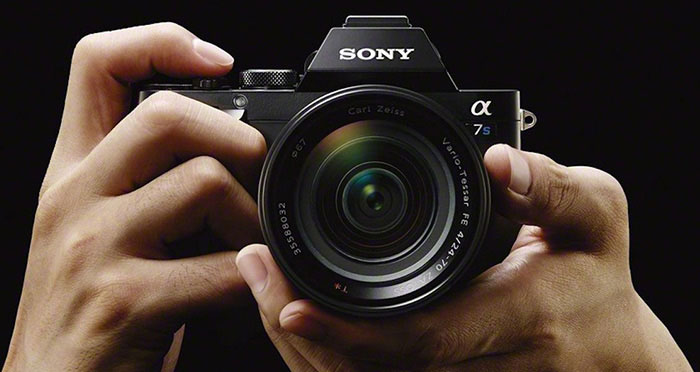
#4. Fujifilm X-T4
Pros:
- 6.5-stop in-body stabilisation.
- 4K video at up to 60/50p.
- High-speed shooting.
- IBIS system works well.
- Good battery life.
Cons:
- New and expensive.
- No headphone jack.
Fujifilm’s X-T4 dramatically improved the video performance compared with its predecessor X-T3. It includes in-body image stabilization, a big step forward. This is a superb option for the run-and-gun filmmaker.
X-T4 improved the very advanced 4k video capability. It is available for you to shoot 4k video at up to 60fps and higher-quality 10-bit video internally. And you can save video at a higher 4:2:2 colour sampling quality. The 4k video reaches a bitrate of up to 400Mbps, with F-log and HLG profiles. All these make it one of the best 4K cameras you can buy.
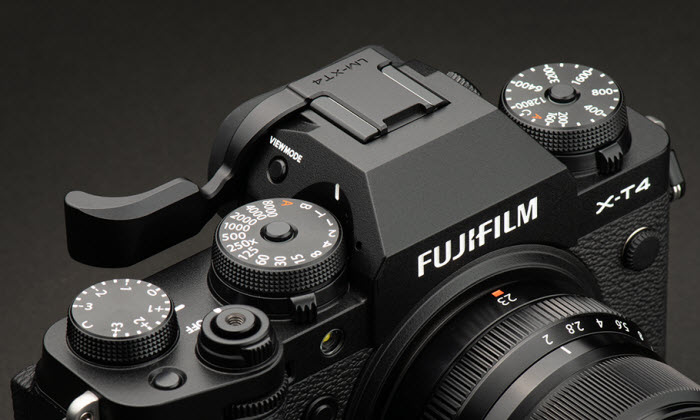
#5. Panasonic Lumix GH5
Pros:
- DCI 4k and UHD 4k。
- Great fully articulating screen.
Cons:
- Limited ISO range.
The arrival of Panasonic Lumix GH5 gives rise to the turbulence of the 4k camera world. 4k video shooting is impressive. You can take cinema 4K (4096x2160) at up to 60fps. And the bitrate reaches to 150Mbps. You can even shoot video with a color subsampling at 4:2:2 and a color depth at 10-bit. This helps deliver richer graduations and greater color information.
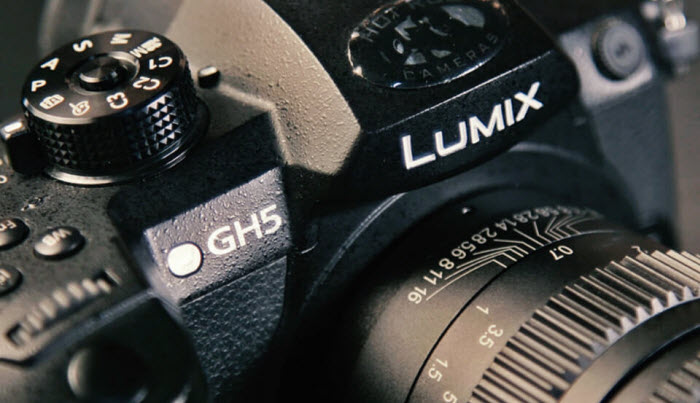
#6. Panasonic GH4
Well, Panasonic GH4 camera is a practical hybrid still/4K video camera which supports 16 megapixel still picture shooting as well as 4K videos recording. It is the first mirrorless camera on the market offering a splendid 4K picture quality, small form factor, ease-of-use and relatively affordable price which is in the reach for amateur photography lovers. Speaking of the 4K video camera feature only, Panasonic GH4 4K camera stands out from its kind. It is capable of recording 4K videos (cinema 4K: 4096x2160 / 24 fps and QFHD 4K: 3840x2160 / up to 30 fps) in MOV/MP4 formats, which can be easily edited/converted for further uses, such as converting MOV to MKV, convert MP4 to AVI/FLV/WMV, etc. with a 4K/8K video converter. And just as its name suggests, Panasonic GH4 4K camera will impress you by producing stunning and lifelike 4K resolution raw videos.
However, this Panasonic 4K video camera has an up to 29 minutes limit for recording motion pictures depending on the output format and sales region. So if you're only planning to do some 4K video pieces recording for family gatherings/travelings, yes Panasonic GH4 4K camera is a nice choice. Instead, you'd look at others.
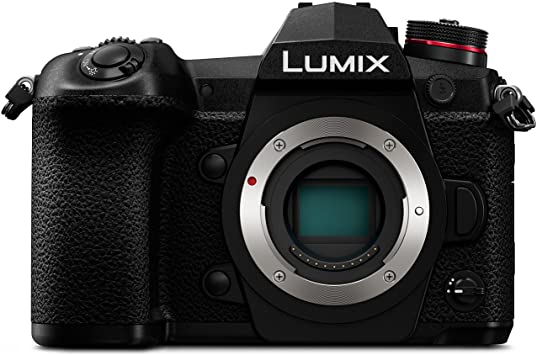
Other 4K cameras from Panasonic:
- PANASONIC LUMIX G9 4K Digital Camera, 20.3 Megapixel Mirrorless Camera plus 80 Megapixel High-Resolution Mode, 5-Axis Dual I.S. 2.0, 3-Inch LCD, DC-G9.
- PANASONIC Lumix GH5 4K Digital Camera, 20.3 Megapixel Mirrorless Camera with Digital Live MOS Sensor, 5-Axis Dual I.S. 2.0, 4K 4:2:2 10-Bit Video, Full-Size HDMI Out, 3.2-Inch LCD, DC-GH5.
- PANASONIC LUMIX GX9 4K Mirrorless ILC Camera Body with 12-60mm F3.5-5.6 Power O.I.S. Lens, DC-GX9MK.
- Panasonic LUMIX G95 20.3 Megapixel Mirrorless Camera, 12-60mm F3.5-5.6 Micro Four Thirds Lens, 5-Axis Dual I.S. 2, 4K 24p 30p Video, Pre-Installed V-Log L, 3" Flip-Out Touchscreen - DC-G95MK.
#7. Sony FDR-AX100/B
As is the often case, there're always new 4K video cameras coming out so it's hard for many beginners to decide which to buy. But Sony FDR-AX100/B, an entry level 4K video camera, is still good enough for pros and amateurs to start 4K video recording. Look into main features that Sony FDR-AX100/B provides, so that you can quickly know if it is the best 4K video camera you are after.
- Dimension: 9.6x6.6x5.4-inch. A palm-sized 4K video camera and it's just 1/4 size of the previous Sony 4K camcorder.
- Weight: 2LB, but still small and light compared to other large professional 4K cameras.
- Lens aperture: a 12x Zeiss lens.
- Sensor size: a single 1-inch back Exmor R CMOS sensor that is larger than many other 4K video cameras and performs well in low-light.
- Display: this 4K video camera features a 3.5-inch Xtra Fine LCD touch screen (921K).
- Video format: XAVC-S (UHD/HD), AVCHD (HD); it's worth mentioning that XAVC-S requires less media storage while recording 4K video at 30fps. Shooting a 2-hour 4K resolution video onto a 64GB SDXC is possible.
- Resolution: it features 14MP video resolution and is capable of 3840x2160 (24/30fps), 1920x1080 (24/30/60fps), etc.
- Audio: 5.1 channel recording (AVCHD only) and 2 channel (XAVC-S).
This 4K video camera from Sony also provides advanced features, such as NFC, Wi-Fi, built-in ND filters, various but easy-to-understand icons. There is no doubt it has the muscle to meet your requirement for YouTube, family stuff even filmmaking. Overall, if you value price/performance ratio, this one should work for you.
If you are fond of diving, biking or any other ourdoor extreme sports, waterproof and solid 4K action camera like GoPro Hero 6 Black is also a good choice.
Sum up
There is no unified standard for the so-called "best" 4K video camera. The one fits you most is the best for you. Providing you've used some better 4K DSLR camera or mirrorless camcorders, welcome to share with us and tell us more user experience.


